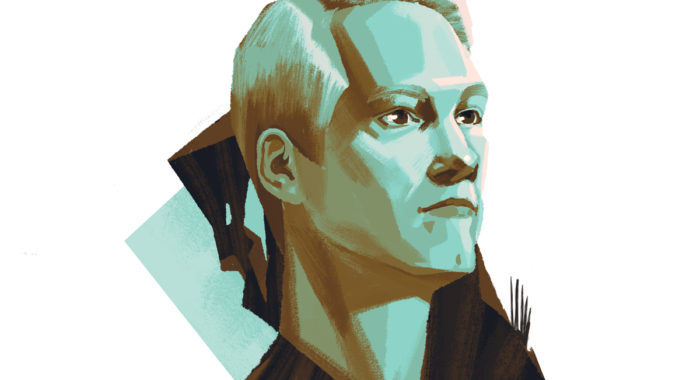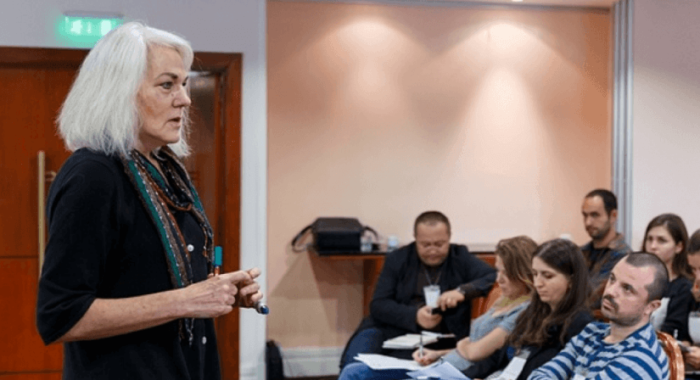Colin Meloy is the singer/guitarist and songwriter for the Portland based band The Decemberists.
Colin formed his first band, Tarkio, at college, in Missoula, Montana. He studied theater and creative writing, and names Dylan Thomas and Morrissey among his influences when it comes to songwriting. He moved to Portland as a wayward twenty-something and started by playing at open mics and in basement bars. Often enough, he didn’t have much of an audience, which in hindsight, he believes, allowed him to experiment a lot and taught him not to take himself too seriously.
Since their founding in 2001, The Decemberists have released seven records and an untold amount of singles and EPs. They have been hailed as a “literate rock band”, because of their wordy, story driven and sometimes dark songs, populated with mariners swallowed by a whale, rogues and evil queens, and even a murderous rake. Colin’s extensive vocabulary and well known passion for obscure words turned him into one of the most intriguing songwriters of the past decade.
The Decemberists have recorded albums in a church, in a warehouse and in a barn, they have toured worldwide and have garnered three Grammy nominations. Their 2011 record, The King is Dead, debuted at #1 on the Billboard album chart.
Colin lives and works on a mid-19th-century farm, just outside Portland, together with his wife, illustrator Carson Ellis and their two sons. During a break in the band’s recording and touring schedule, he wrote the books that would comprise the New York Times bestselling Wildwood Chronicles, a trilogy of novels for middle-grade readers illustrated by Carson. The books are set in a reimagined version of modern-day Portland where the city’s 5,000 acre wooded park, Forest Park, is The Impassable Wilderness, an enchanted country inhabited by warring coyotes, fearless bandits and meditating mystics. And just about enough Meloy-esque darkness to keep the kids completely gripped.
Here are some of his thoughts on creating music and performing on stage:
•“I think if you end up thinking too much about your audience, you get yourself into trouble”, he says in an interview. “Hopefully whatever you’re doing is coming from a very genuine place and not this expectation that you need to please or pacify an audience. But as you get on, you can’t help but think about that. How long will people be buying our records? How long will people keep inviting me into their iPhones? That’s sort of the unknowable thing, and I don’t want to ingratiate myself and be that person constantly knocking on people’s doors. But you also don’t want to be abandoned either.”
•“I’m pretty shy and reclusive. But being on stage is a completely different thing… a completely energizing thing for me”, reveals Colin here. “I think it’s a spiritual thing. Being on stage fulfills a very important part for some people and, as I said, can be very therapeutic. You know, whatever mood I’m in prior to going on stage—it can be panicked or sleepy or angry, all these different things—immediately, if everything is going smoothly, it’ll just be erased. It’ll be wiped clean… to the point where my onstage persona is completely separate from my offstage persona. And that can be an amazing thing. It removes yourself from yourself in that moment. It’s really powerful and it’s done no end of good for me.”
•“The appeal of going to a barn or a church or any unconventional and neutral space is turning it into your own creative space. You’re connected to the space in a way that you wouldn’t be in a studio. And it’s such a crazy time—you’re spending 10 hours a day just in this room, working intently. You develop a relationship with the room itself; the room becomes part of the process, in a way”, is how Colin describes his creative space.
•“Like with any record, I think that even if there’s not a narrative, there’s a through-line—like any collection of short stories should have something that connects it all together, even if it’s something intangible, like a mood or a tone”, is what he says about his songwriting.
Register here for the 6th edition of The Power of Storytelling to meet Colin Meloy in person. Until then, listen to the playlist we put together.



